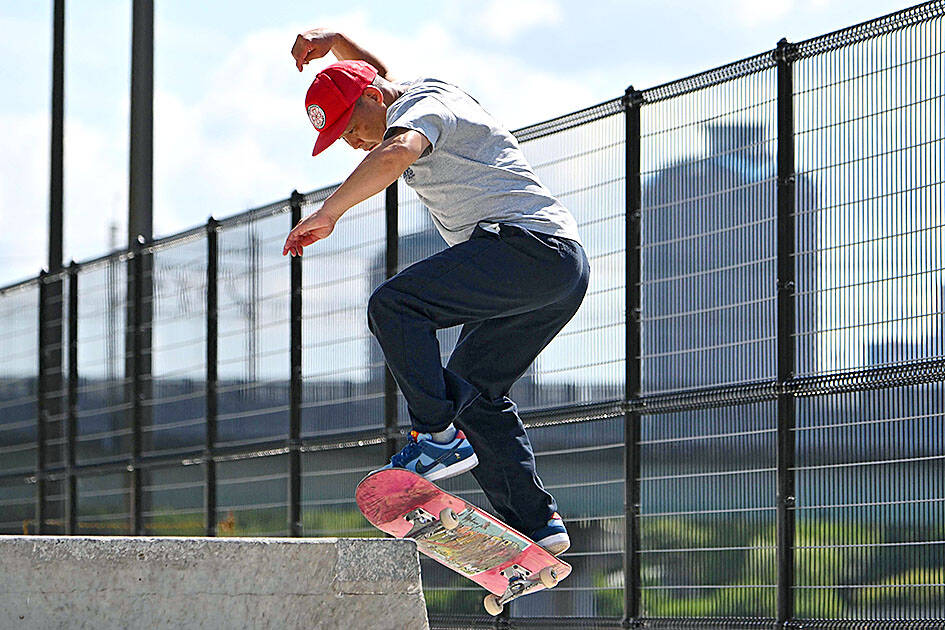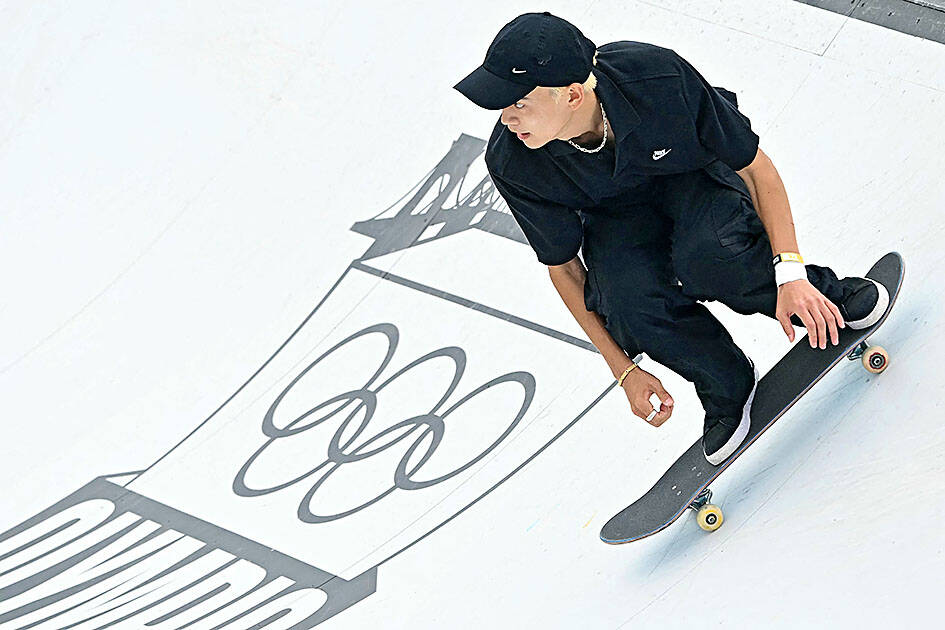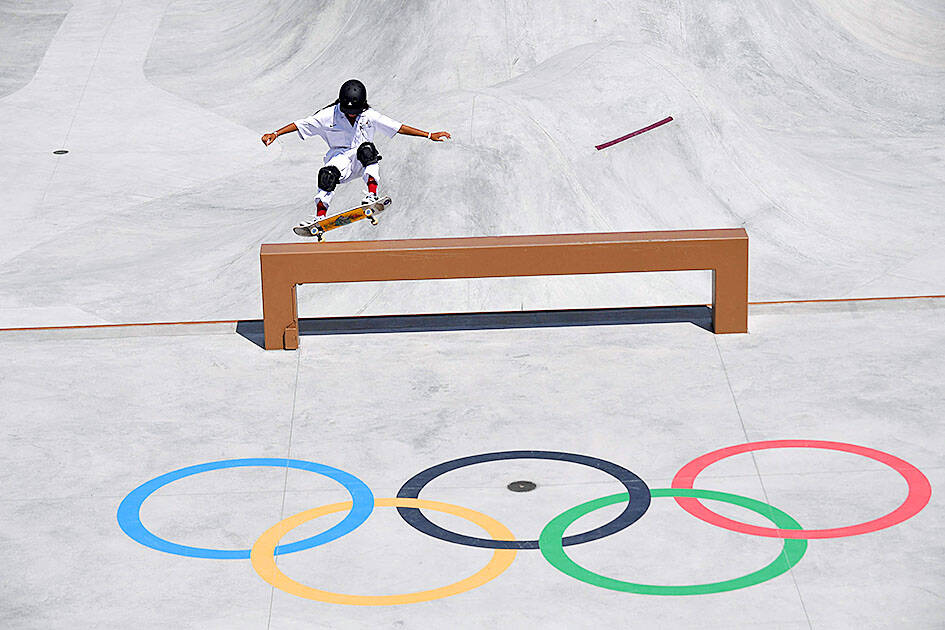Japan used to think skateboarding was a pastime for delinquents but the country has grown into a global powerhouse in the sport and is expected to dominate at this month’s Paris Olympics.
Children as young as six can be seen zipping up ramps and grinding down rails at skate parks, with instructors teaching tricks while parents wait patiently nearby.
It is a far cry from skateboarding’s original street culture image, but it is producing spectacular results, with Japan winning three of the four available golds on the sport’s Olympic debut in Tokyo three years ago.

Photo: AFP
National team coach Daisuke Hayakawa said that the number of skaters in Japan had tripled since and believes his team can clean up at the Paris Games.
Ominously for everyone else, he says they will have a steady production line of talent for years to come.
“It’s become something that kids take lessons in,” said the 50-year-old. “Parents used to tell their kids to stop skateboarding. Now parents take their kids to skate parks. If their shoes or boards wear out, they buy them new ones.”

Photo: AFP
Hayakawa was speaking at a Tokyo skate park that opened in 2022, one of several to spring up since the Olympics.
Despite the punishing summer heat, the sound of wheels clacking against concrete and wood scraping against metal hangs in the air as skaters young and old practice.
“Things have completely changed because of the Olympics. It has had a big impact,” said Takumi Shimabukuro, a parent watching his nine-year-old son Yuya fearlessly fly up and down a halfpipe.

Photo: AFP
TEENAGE KICKS
International competitions are regularly won by young skaters but the ages of Japan’s medalists at the Tokyo Games were eye-catching by any standard.
Kokona Hiraki took silver in the women’s park competition at the age of 12, while women’s street gold medalist Momiji Nishiya was 13.
Japan will head to Paris with another fresh-faced squad featuring a pair of 14-year-olds in men’s prodigy Ginwoo Onodera and women’s street skater Coco Yoshizawa.
Hayakawa believes the fearlessness of youth was a big factor in Japan’s Tokyo Games success.
“They were too young to understand the importance of the Olympics,” he said. “They didn’t really know how big a stage they were competing on, so they weren’t nervous.”
Japan’s team for Paris will also feature defending men’s street champion Yuto Horigome, who clinched his place by winning the qualifying competition in Budapest last month.
The 25-year-old was on the verge of missing out after a disappointing showing at the previous qualifying event but he came through when it counted.
Hayakawa describes Horigome as an elder statesman who has been an inspiration for Japan’s younger generation.
“He set his sights higher, he entered international competitions, he got better and better and became recognized as the best street skater in the world,” said Hayakawa.
“Young kids here saw that and thought, ‘If Yuto can do it, we have a chance as well.’”
STRENGTH IN DEPTH
Horigome is determined to retain his street title in Paris but he will face stiff competition from his own team-mates.
Sora Shirai is the reigning world champion, while Onodera finished second in Budapest, where half of the eight finalists were Japanese.
Competition for squad places was so fierce that world silver medalist Kairi Netsuke missed the cut.
“It really feels like you’re representing your country,” Horigome said after locking up his spot. “It’s different from other competitions.”
Coach Hayakawa started skateboarding almost 40 years ago and has seen it evolve from its shady roots on the streets to become an Olympic sport.
He says he will be happy if the Paris spotlight brings more kids to skateboarding and believes Japan can remain a hotbed of talent.
“We’re diligent and we put in a lot of practice,” he said. “We think about how best to win a competition. We’re also not so big physically, so the way we move our bodies is suited to skateboarding.”

The canonical shot of an East Asian city is a night skyline studded with towering apartment and office buildings, bright with neon and plastic signage, a landscape of energy and modernity. Another classic image is the same city seen from above, in which identical apartment towers march across the city, spilling out over nearby geography, like stylized soldiers colonizing new territory in a board game. Densely populated dynamic conurbations of money, technological innovation and convenience, it is hard to see the cities of East Asia as what they truly are: necropolises. Why is this? The East Asian development model, with

This is a deeply unsettling period in Taiwan. Uncertainties are everywhere while everyone waits for a small army of other shoes to drop on nearly every front. During challenging times, interesting political changes can happen, yet all three major political parties are beset with scandals, strife and self-inflicted wounds. As the ruling party, the Democratic Progressive Party (DPP) is held accountable for not only the challenges to the party, but also the nation. Taiwan is geopolitically and economically under threat. Domestically, the administration is under siege by the opposition-controlled legislature and growing discontent with what opponents characterize as arrogant, autocratic

June 16 to June 22 The following flyer appeared on the streets of Hsinchu on June 12, 1895: “Taipei has already fallen to the Japanese barbarians, who have brought great misery to our land and people. We heard that the Japanese occupiers will tax our gardens, our houses, our bodies, and even our chickens, dogs, cows and pigs. They wear their hair wild, carve their teeth, tattoo their foreheads, wear strange clothes and speak a strange language. How can we be ruled by such people?” Posted by civilian militia leader Wu Tang-hsing (吳湯興), it was a call to arms to retake

When Lisa, 20, laces into her ultra-high heels for her shift at a strip club in Ukraine’s Kharkiv, she knows that aside from dancing, she will have to comfort traumatized soldiers. Since Russia’s 2022 invasion, exhausted troops are the main clientele of the Flash Dancers club in the center of the northeastern city, just 20 kilometers from Russian forces. For some customers, it provides an “escape” from the war, said Valerya Zavatska — a 25-year-old law graduate who runs the club with her mother, an ex-dancer. But many are not there just for the show. They “want to talk about what hurts,” she